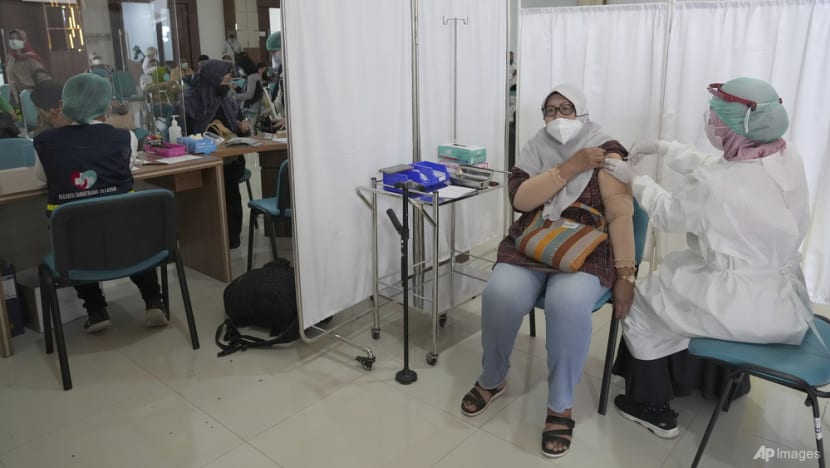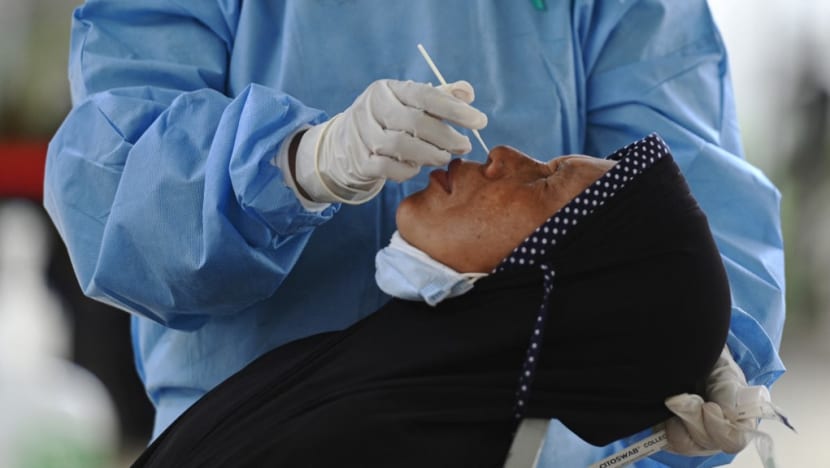Why Indonesia’s full vaccination rate lags behind other countries in the region
The national COVID-19 task force is ramping up vaccination efforts during the fasting month in order to suppress another potential wave of infections during Idul Fitri.

A woman receives a booster shot of the COVID-19 vaccine during a third dose vaccination campaign at a South Tangerang Regional General Hospital in Tangerang, Indonesia, on Jan 12, 2022. (Photo: AP/Tatan Syuflana)
JAKARTA: Dina, who hails from Central Java but studies in the East Javan city of Malang, is dying to go back to her hometown during the upcoming Idul Fitri holidays.
The 22-year-old university student has not been home since late last year after some physical classes resumed on campus.
The first thing she wants to do when she reaches home? To convince her mother to get vaccinated against COVID-19.
“My mother is a strong anti-vaxxer,” Dina, who only wanted to be known by her first name, told CNA.
“She has been reading hoaxes forwarded by her friends over WhatsApp. She truly believes that vaccines are more dangerous than the coronavirus, even though some of her neighbours and friends have died from COVID-19.”
Around 15 months after launching a massive national vaccination drive, Indonesia is lagging behind some of its Southeast Asian neighbours in terms of full vaccination rate.
The world’s fourth most populous country has 59 per cent of its 270 million population fully inoculated as of Monday (Apr 4).
In comparison, Singapore has 92 per cent of its total population fully vaccinated while Malaysia’s figure is 79 per cent. Meanwhile, Thailand’s and Vietnam’s figures are reportedly 72 per cent and 79 per cent respectively.
Around 232 million people in Indonesia are over six years old and thus eligible to be vaccinated against COVID-19.
According to figures from the Indonesian health ministry, as of Apr 4, there are around 72 million Indonesians over the age of six who have not been fully vaccinated. Of this figure, more than 35 million have not been inoculated at all.
The national vaccination drive appears to be losing steam. Experts say this means that there are millions of people who are at risk of contracting COVID-19 and developing life threatening symptoms should Indonesia face another wave of infections.
With a holiday exodus on the cards during Idul Fitri, the government wants more to be vaccinated this Ramadan.
VACCINATION DRIVE LOSING STEAM
Windhu Purnomo, an epidemiologist at Indonesia’s Airlangga University noted that Indonesia’s vaccination drive is slowing down overall, particularly for the first and second jabs.
According to data from the health ministry, there were 23 million vaccinations in March. More than half were boosters for people who were already fully vaccinated.
This is a far cry from how more than 2 million jabs were administered daily during the early days of Indonesia’s vaccination drive which kicked off in January last year.
“Back then, vaccines were in demand from people who truly understood that they needed to protect themselves from the virus. But these people represent at most 60 per cent of the population,” Mr Purnomo told CNA.
Montty Giriana, vaccination division coordinator at Indonesia’s Committee for COVID-19 Mitigation and National Economic Recovery (KPCPEN) admitted last week that the number of vaccinated Indonesians is hitting a plateau.
“Some people are afraid of the side effects of vaccination,” Mr Giriana said during a parliamentary hearing on Mar 30. Another reason, he continued, is that some people live in remote villages and find it hard to get to vaccination centres, particularly the elderly.
“We need to educate the public that vaccination is important and that the side effects are mostly harmless. There must also be efforts to make door-to-door visits,” he said, adding that such efforts require a lot of time, manpower and money.

MULTIPLE CHALLENGES
There are multiple challenges in keeping up the pace for the vaccination drive.
Mr Purnomo of Airlangga University said that there are many people who are only partially vaccinated and have no desire to go for a second jab.
In February, Health Minister Budi Gunadi Sadikin revealed that there were 2.5 million partially vaccinated people who didn’t get their second jab within six months after their first. The minister said such individuals would have to redo their vaccination from the start because of loss of effectiveness.
The government has introduced a number of restrictions for those who have not been fully vaccinated. These include barring them from using public transportation, entering office complexes or visiting places like shopping malls.
However, public health expert Hermawan Saputra said that the restrictions won’t deter those who outright refuse to get vaccinated.
“There are those who are adamant about not having themselves vaccinated because of hoaxes and misinformation,” the Indonesian Public Health Expert Association adviser told CNA. “Not everyone needs to travel, go to the office or enter the mall.”
Mr Saputra noted that during Indonesia’s third wave of infections in the later part of 2021, the majority of those who died from a COVID-19 infection were unvaccinated or only partially vaccinated.
“There are millions of Indonesians who have no defence at all (against COVID-19) and they are the ones who are at risk the most if another wave (of infection) comes,” he said.
Related:
RAMPING UP VACCINATION DRIVE DURING RAMADAN
Wiku Adisasmito, the spokesman for Indonesia's COVID-19 Mitigation Task Force said the government is trying to expedite the country’s vaccination drive during the Ramadan fasting month which has just begun.
The government, Mr Adisasmito added, hoped to have at least 70 per cent of the population completely vaccinated – up 11 percentage points from 59 per cent currently – before the Idul Fitri holiday in early May, which marks the end of the fasting month.
Each year, millions of Indonesians travel to their hometowns to be with their families for Idul Fitri.
“Looking back on our experience during the 2020 and 2021 fasting months, the number of cases rose as people’s mobility and activity increased. Therefore, in 2022, we need to suppress infection as much as possible,” Mr Adisasmito told CNA.
The task force spokesman acknowledged that there are millions of Indonesians, including 21 per cent of the elderly population, who are partially vaccinated or unvaccinated.
“We are urging vulnerable people like the unvaccinated and those with comorbidities to exercise more caution when interacting with others. If infected, they have a greater risk of developing severe symptoms and even death,” he continued.
“The central government will continue to push regional governments to accelerate their vaccination drives,” he said.
Mr Purnomo of Airlangga University noted that lately, regional authorities have only been accelerating booster shots for those who are already fully vaccinated, while doing little to address the more challenging issue of getting those who are unvaccinated to go for their jabs.
“First and second (vaccine) dosages only hover at around 100,000 jabs per day. We need to do something about this. We need to get tough towards the unvaccinated. We need to increase our efforts to educate the public and criminally charge those who have been spreading misinformation and lies about vaccination,” he argued.
“And we need to do this fast before another wave hits the country.”
BOOKMARK THIS: Our comprehensive coverage of the COVID-19 pandemic and its developments
Download our app or subscribe to our Telegram channel for the latest updates on the coronavirus pandemic: https://cna.asia/telegram














